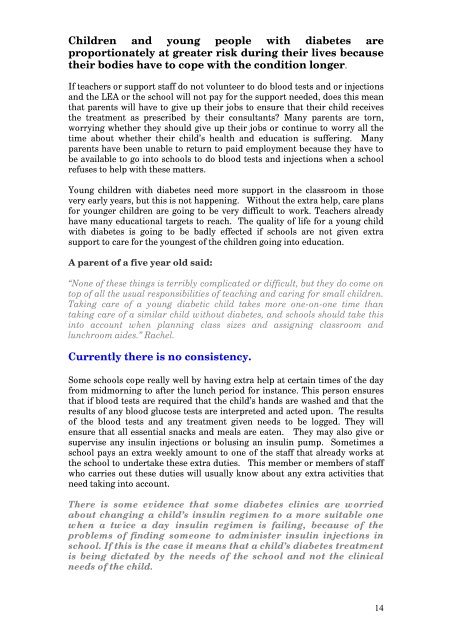Every Child Matters - Children with Diabetes
Every Child Matters - Children with Diabetes
Every Child Matters - Children with Diabetes
- No tags were found...
You also want an ePaper? Increase the reach of your titles
YUMPU automatically turns print PDFs into web optimized ePapers that Google loves.
<strong>Child</strong>ren and young people <strong>with</strong> diabetes areproportionately at greater risk during their lives becausetheir bodies have to cope <strong>with</strong> the condition longer.If teachers or support staff do not volunteer to do blood tests and or injectionsand the LEA or the school will not pay for the support needed, does this meanthat parents will have to give up their jobs to ensure that their child receivesthe treatment as prescribed by their consultants? Many parents are torn,worrying whether they should give up their jobs or continue to worry all thetime about whether their child’s health and education is suffering. Manyparents have been unable to return to paid employment because they have tobe available to go into schools to do blood tests and injections when a schoolrefuses to help <strong>with</strong> these matters.Young children <strong>with</strong> diabetes need more support in the classroom in thosevery early years, but this is not happening. Without the extra help, care plansfor younger children are going to be very difficult to work. Teachers alreadyhave many educational targets to reach. The quality of life for a young child<strong>with</strong> diabetes is going to be badly effected if schools are not given extrasupport to care for the youngest of the children going into education.A parent of a five year old said:“None of these things is terribly complicated or difficult, but they do come ontop of all the usual responsibilities of teaching and caring for small children.Taking care of a young diabetic child takes more one-on-one time thantaking care of a similar child <strong>with</strong>out diabetes, and schools should take thisinto account when planning class sizes and assigning classroom andlunchroom aides.” Rachel.Currently there is no consistency.Some schools cope really well by having extra help at certain times of the dayfrom midmorning to after the lunch period for instance. This person ensuresthat if blood tests are required that the child’s hands are washed and that theresults of any blood glucose tests are interpreted and acted upon. The resultsof the blood tests and any treatment given needs to be logged. They willensure that all essential snacks and meals are eaten. They may also give orsupervise any insulin injections or bolusing an insulin pump. Sometimes aschool pays an extra weekly amount to one of the staff that already works atthe school to undertake these extra duties. This member or members of staffwho carries out these duties will usually know about any extra activities thatneed taking into account.There is some evidence that some diabetes clinics are worriedabout changing a child’s insulin regimen to a more suitable onewhen a twice a day insulin regimen is failing, because of theproblems of finding someone to administer insulin injections inschool. If this is the case it means that a child’s diabetes treatmentis being dictated by the needs of the school and not the clinicalneeds of the child.14





